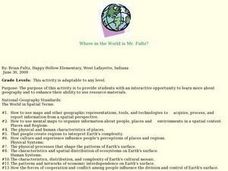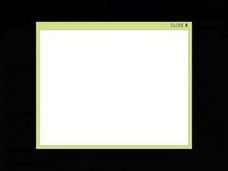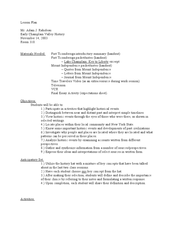Curated OER
Where in the World is Mr. Fultz?
Students use maps and other geographic resources to learn about their world while problem solving. They read clues each day and use classroom resources to narrow down where the prize is located.
Curated OER
What Do We Owe To Thoreau?
Students use this design as an electronic reading and writing guide to Henry David Thoreau's famous essay, "On Civil Disobedience." They use activities to familiarize students with the political issues of Thoreau's time. Comprehension...
Curated OER
Louisiana's Major Folk Regions
Learners study the three major folk regions of the state. They break the regions down into smaller folk regions or use the concept of three regions: North Louisiana, South Louisiana, and New Orleans. They identify some of the markers...
Curated OER
Native American Culture
Students read a variety of Native American Literature and discuss the main idea by answering critical thinking questions about the poem. Students use context clues to understand the feeling of the Native American culture about the Earth....
Curated OER
Applying Principles of Civic Liberty
Third graders relate the everyday duties in the classroom and in the community. In this character education instructional activity, 3rd graders compare duties in the classroom to duties in the community and chart them on a Venn diagram....
Curated OER
War and Religion
Students examine world conflicts. In this War on Terrorism lesson, students investigate the criteria of just wars and then determine whether the War on Terrorism fits into the category.
Curated OER
Introduction to World Religions
Sixth graders compare and contrast the world religions. In this cultural practices lesson plan, 6th graders locate places in the world where Buddhism, Christianity, Judaism, Hinduism, and Islam are practiced.
Curated OER
Bystanders in the Holocaust
Students recognize effects of apathy and indifference, examine behaviors associated with obedience, conformity, and silence, and explore legal responses to issues raised by the Holocaust.
Curated OER
Christopher Columbus
Students read about the good and bad aspects of Christopher Columbus in Jean Fritz's book, "Where do you think you're going, Christopher Columbus?" They conduct and analyze a survey about common myths and create a pop-up book.
Curated OER
Journey
Students complete a variety of enrichment activities that focus on the book, Journey, by Patricia MacLachlan. They create a photo album that shows their own family history.
Curated OER
The City Symphony- The Original Reality Show
Learners discuss the purpose of city symphonies that were used in the past. In groups, they compare and contrast the social systems of a school and city to create their own city symphony video together. They also write what is known as...
Curated OER
Painting Faces
Students study Robert Harris and his work. They examine his portraits and self-portraits and create their own self- portraits. They discuss the life of the artist and write a short biography.
Curated OER
What is Canadian?
Students explore how artworks can become symbols of national identity. They examine and analyze Song of the Nations, a site specific sculpture by Quebecois artist Armand Vaillancourt that expresses his views of Quebec's position...
Curated OER
Causes of World War I
Ninth graders identify and explain the six major causes of World War I. They explore the events leading up to WWI, the assassination of Franz Ferdinand and why they were the culmination of everything. Students discuss the...
Curated OER
Geography, Ecology, and Folklife
Students identify how do geography and ecology influence a region's folklife. Then they investigate this question and consider how an outsider might view their own region in this lesson. Students also identify how the natural world, even...
Curated OER
Using Primary Sources to Discover Reconstruction
Fifth graders discover how reconstruction had an impact on racial issues in the United States. In this Reconstruction lesson, 5th graders are introduced to primary vs. secondary resources and then rotate through stations to view...
Curated OER
Walk in My Shoes
Students discover how culture, geography and history affect how someone views an area of the world. They role play the role of a Palestinian, Jew or Briton and examine how they felt about Israel during its formation. To end the lesson,...
Curated OER
Twentieth Century Entertainment: When Work is Done
Students determine how Americans enjoy leisure time. In this 20th century America lesson, students research primary sources to study how Americans gained leisure time during the century and what they did with it.
Curated OER
Early Champlain Valley History
Class members use primary sources to craft an essay about early Champlain Valley History. I would use this as a homework assignment.
Curated OER
Whitewashing History
Students revisit issues of civil rights in the U.S. They use the recent national discussion of retiring Senator Strom Thurmond's 1948 Dixiecrat Presidential campaign as a starting point.
Curated OER
Atmospheric Pressures
Students research past, present and proposed climate change policies. They develop timelines based on different predictions of climate change effects and assess the likelihood of each timeline playing out in reality.
Curated OER
Speaking in Grave Tones
Fourth graders examine how a change in attitudes about death took place from the late eighteenth to the early nineteenth century and was embodied in gravestones, literature, and art.
Curated OER
Jewish Assimilation In Contemporary American Literature
Students form groups to help each other read, analyze, and conduct research on important background information about Jews and their assimilation into modern American society. They write their own stories of assimilation.
Curated OER
Roots of Religious Liberty
Students examine the First Amendment and consider the contributions of James Madison and Thomas Jefferson. They review conflicts between the rights of Church and State and write a Madisonian argument on the issue.























